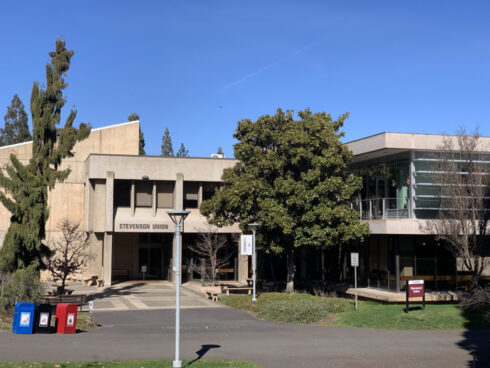Following the Presidental Letter, from Southern Oregon University’s President Rick Bailey and Vice President Toya Cooper, the Siskiyou found it important to futher inform the student body on the matters of the Oregon Shakespeare Festival’s (OSF) community and Nataki Garrett. While this letter touched grounds on the situation and expressed support and solidarity for Nataki Garrett in her authority as OSF’s artistic director, it did not go into the full depth that you need to know to completely grasp the headline.
Nataki Garrett has accomplished a plethora of achievements in the theatre community; therefore, aiding in her feat of becoming the first woman of color to direct a highly celebrated performing arts organization. Of these accomplishments, Garrett has functioned as the Artistic Director and Associate Artistic Director for both the CalArts Center for New Performance and the Denver Center for the Performing Arts Theatre Company. Additionally, she has won awards, such as the 2022 United States Artist fellow and the National Endowment for Arts and Theatre Communications Group Career Development Fellowship for Theatre Directors. According to Nataki Garrett’s Artist Statement, she has even “testified before Congress on the need to support the creative economy” as a champion for the Arts, Artists, and Artistic Community. Currently, she is aiding in the resurgence of OSF from its disappearance during quaratine.
While OSF is extremely popular for its seasonal productions, the presence of COVID-19 took a large hit on its popularity; therefore, it needed a strong leader to encourage the public back into its quarters. The Oregon Shakespeare Festival is one of the oldest and largest non-profit theatres in the country, since its founding in 1935. However, an article written by Bilal Qureshi, a reporter for the National Public Radio (NPR), showcases how things have changed, due to the pandemic. He writes, “ Like most theaters across the country, the audience is diminished; less than 50% have returned to OSF’s reopened stages. Throughout this season, several performances on those stages have been canceled due to smoke from Oregon’s wildfires and COVID-19 outbreaks”. Due to the donor and audience disappearance, Nataki Garrett made it her mission to rescue the Theatre. As consequence of her family of educators, artists, and community organizers, Nataki Garrett has developed a passion for telling untold stories that impact the diversity and inclusion of theatre; therefore, she has decided to bring these stories into the OSF spotlights in an effort to draw in a new and younger audience, which will be fundamental to the entire environment’s survival. Additionally, she raised $19 million through federal, regional, and foundational funding. Finally, NPR proclaims, “Behind the scenes, Garrett has been changing the company’s labor practices, restructuring everything from payment systems to rehearsal hours in order to ensure a more humane workplace that can attract and maintain workers of all backgrounds. There is an entire new division built around inclusion, equity and access…” Finally, she has been pushing forth reduced price tickets and building upon digital programs for Internet performances.
While Nataki Garrett has certainly benefitted the OSF community, many are discouraged by her attempts. Notably, Herbert Rothschild, a longtime OSF subscriber and local columnist spoke out about the lack of Shakespeare in the current season. He proclaimed, “My concern is that they have decided to essentially remake the OSF into something it wasn’t … instead of building on their strengths, really turning their back on its strengths. If so, I think they’re going to drive it into the ground.” These comments sparked a community-wide conversation and letter-writing movements in contradiction to Garrett. Many of which included death threats and intimidations of violence. It is important to note that Rothschild’s columns did not particularly invite death threats, as Garrett had been recieving them beforehand. Of the potential reasoning behind this, the history of theatre audiences and the community of Ashland may reveal truth. According to NPR, “The American theater has relied for decades on that one demographic of people … over 65, affluent, white. It’s sort of the bread basket of the industry”. The Oregon Shakespeare Festival faces this themselves with their high white and aging subscriber and donor base. Ashland, itself, was founded with a constitution including a racial exclusion clause and has had an active KKK presence well into the current time period. These threats have forced Nataki Garrett to undergo security measures, not shared for privacy and safety reasons. Within the Ashland community, Mayor Julie Atkins has spoken out against the issue and urged the community to take action, after her monthly meeting with David Schmitz, the OSF Exective Director, and a conversation with Garrett herself.
On account of this information, the Siskiyou reached out to Pati Navalta, the head of OSF’s Press Release, in the hopes of obtain an answer to the following question:
On a national level, what does OSF believe needs to be done to protect artists, similar to Nataki?
In return, we received answers from both David Schmitz and Nataki Garrett. David Schmitz acclaims, “If we broaden the question to how do we support artistic leaders and artists of color, the answer is that we need to provide them with the resources, opportunities and financial support needed in order to make the changes to our field that are necessary for our ongoing evolution – the same resources, opportunities and financial support their white colleagues have and will continue to receive”. He explained that the field of theatre is at a turning point, wherein audiences will not be returning in the same way they attended in 2019, before the pandemic. Instead, we need artists and leaders of color need people to invest, lean in, and enthusiastically enjoy their work. He believes that this generation will guide us through this storm and many to come. In regards to Garrett, she asserted, “My circumstance is singular because of the history of the founding of the State of Oregon with its exclusion laws and the history of southern Oregon maintaining some of those practices into modern times. What we do share with our sister theaters is that in 2020 the entire country experienced a “racial reckoning” with the public execution of George Floyd at the hands of police officers in Minneapolis, MN. The theater industry responded with organized efforts including ‘We See You White American Theater’, which drew up a letter with over 300 signatures from Theater Industry professionals of the Global Majority…. In truth, not every theater that pledged to change their ways will actually make substantive change, but all of us who are dedicated to shifting our systems to be more inclusive and more equitable are experiencing some blowback from within our organizations and also from some of our patrons and donors”. She finished by saying that OSF is working with many other theatres to assure that Artists of the Global Majority, LGBTQ+, and disabled artists will be centered through intentional practices in support of their art.
Alongside Southern Oregon University’s statement, many other prominent groups, including the Dramatists Guild, the Theatre Communications Group, and the Shakespeare Theatre Association, have reached out in support of Nataki Garrett and her efforts with the Oregon Shakespeare Festival. If you wish to join in on this support, please leave a sympathetic and reassuring message for Garrett on the OSF Website or any of OSF’s Social Media Platforms, listed here: @osfashland and @natakigarrett. Additionally, please consider attending the oncoming shows and showing support, as this will show OSF that their efforts are not in vain.



